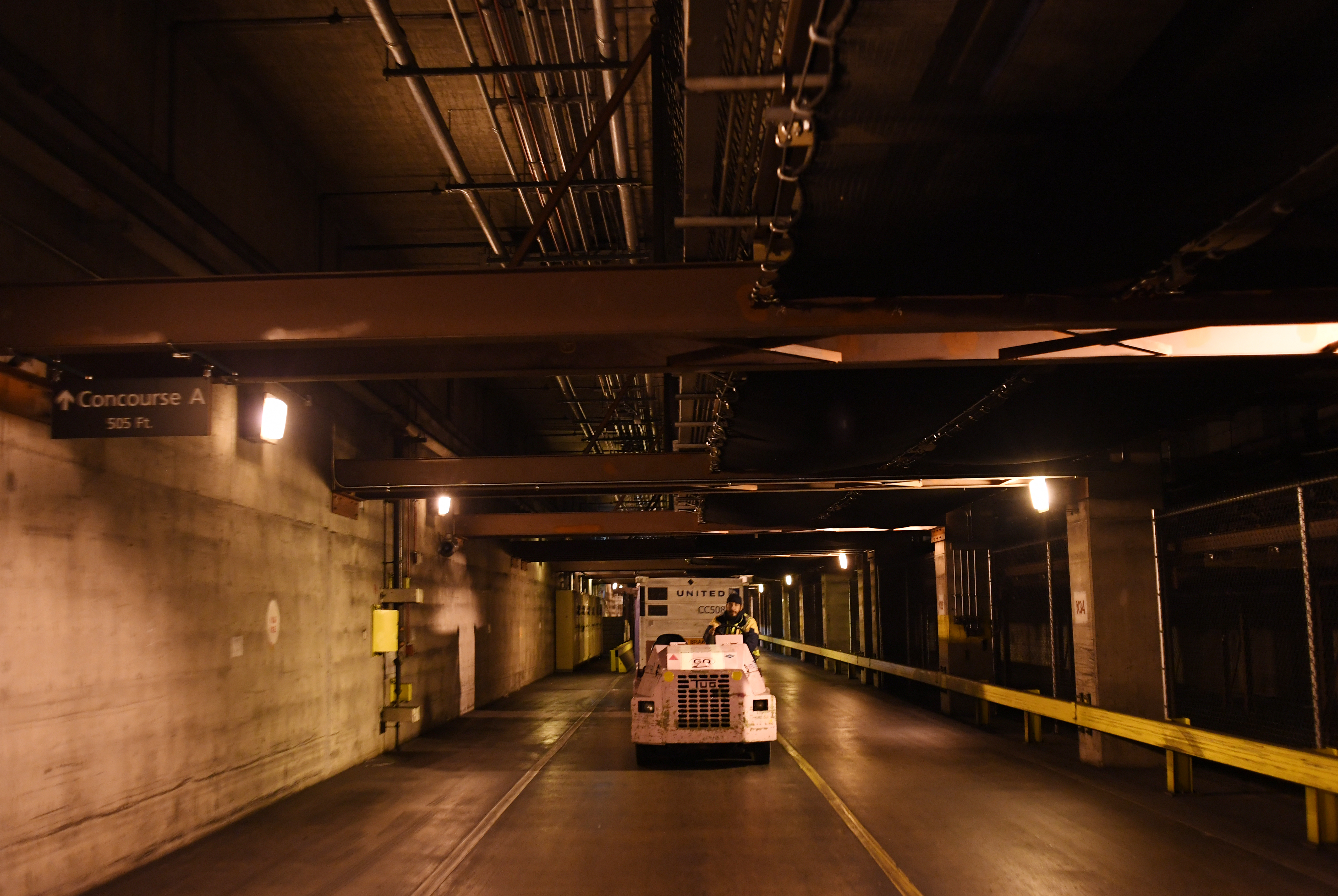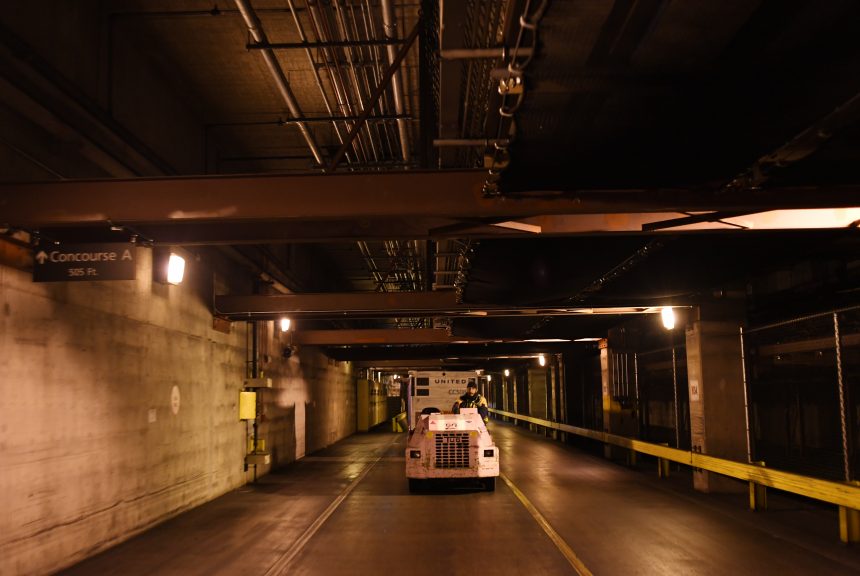Even for Denver International Airport, the size of a proposed contract for baggage system upgrades is big — a maximum $500 million.
But it’s not the size that gives some Denver City Council members pause. Nor is it the projects themselves, which in coming years would replace aging, sometimes-glitchy equipment that’s used to screen tens of thousands of checked bags each day, move them around the terminal and deposit them in the baggage claims.
It’s that airport officials only know for certain that they’ll move ahead with two projects costing less than half of that total. Three more on their list depend on federal grants they haven’t won yet. They hope to cash in on new funding for airport improvements unleashed by the $1.2 trillion infrastructure bill approved by Congress late last year.
While DIA isn’t guaranteed to receive more grant money in coming years, it’s seeking blanket authorization now to spend $193 million on those three uncertain projects — just in case.
“I’m not completely comfortable just approving that authority at this point in time, knowing full well it’s a wait-and-see,” Councilwoman Debbie Ortega said during a committee hearing Wednesday.
A DIA projects leader assured her the uncertain projects would happen only if the airport wins new grants in the $1 billion-a-year improvement program, which the Federal Aviation Administration kicked off this summer and is running for four more years.
The combined contract for five projects — whether all happen or not — reflects DIA’s urgency as it attempts to be competitive, argued Michael Sheehan, DIA’s senior vice president for special projects.
Airport leaders plan to seek $154 million in federal aid for the three unfunded projects, or 80% of their combined cost. That would be on top of $60 million DIA was awarded this year for another baggage system modernization project, one of the largest single awards to 85 airports that split this year’s allocation in the FAA’s Airport Terminal Program.
“The intent is to position DEN in a place to be at the forefront to receive additional funds,” Sheehan said of the airport. “If we do a standalone new procurement each year, we’re very much at risk of not being in position to receive additional funds.”
Projects to modernize the baggage system have particular resonance at DIA, which saw its original opening repeatedly delayed until early 1995 in large part because it couldn’t get the snazzy, expensive new automated baggage system to work right.
That system is long out of commission, though the tracks are still collecting dust inside DIA’s tunnels.
This time, the aim is less ambitious: to replace existing equipment in the terminal with new versions that perform better. The proposed projects follow others undertaken in recent years to improve baggage handling.
The council hearing was the first public airing of the proposed contract with PCL Construction Services. The business and aviation committee advanced it on a voice vote, but not before the panel’s leaders asked DIA to detail the five projects and their rationale for using a speculative single contract in a memo to all council members before it comes up for a final vote next month.
“Once it comes to the floor and they see a $500 million price tag, they probably would want some additional due diligence,” said Councilman Chris Hinds, who chairs the committee.
Notably absent from the hearing was airport CEO Phil Washington, who’s presented most big contracts for airport projects during his year in the job. He’s been nominated by President Joe Biden to be the FAA’s next administrator, pending Senate confirmation, and would oversee its grant programs.
DIA spokeswoman Stacey Stegman said he missed it because he was giving a presentation out of state on that day.

Contract is DIA’s latest big project deal
PCL beat out three other bidders for DIA’s latest mega-deal as it modernizes and expands the airport to keep up with growing passenger traffic, which has nearly recovered from the pandemic.
That work has produced other eye-popping numbers in recent years: $2.1 billion to transform most public spaces in the 1.5 million-square-foot Jeppesen Terminal, a price tag that’s increased significantly since the project began. Another $2.4 billion (with the latest additions) to add 39 traditional gates across all three concourses for United and Southwest airlines, to build 14 ground-loading gates at the end of Concourse A for Frontier Airlines and upgrade other parts of those buildings.
All told, DIA is finishing a $4.2 billion, five-year capital program and preparing another $3.1 billion program for the next five years.
Most of the proposed baggage system projects are set out for the upcoming program, which will be paid for using DIA’s fee and tenant revenue, borrowing and federal grants. Airport leaders have said they plan to apply for grants aggressively.
For now, DIA has money secured for two baggage-related terminal projects that would begin soon:
- A $131 million project to replace 31 explosive-detection screening machines for checked bags with 25 new screeners that have higher throughput, increasing overall hourly screening capacity by 36%, DIA says. Nearly $56 million of the cost will be covered by the Transportation Security Administration.
- A $97 million upgrade and modernization of the conveyors, high-speed diverters and other equipment that feed bags into the screening machines. To offset the cost, DIA was awarded the $60 million FAA grant, which was short of its $77.6 million request.
All that work will require phasing to avoid interrupting airlines’ operations, Sheehan said.
He said the large screening machines are overdue for replacement, noting an incident during the holiday season last year in which several units were disabled by a brief power failure and took hours for the short-staffed TSA crew to get running again. In the meantime, United Airlines had to stop checking in bags during a peak period.
“It’s the right project at the right time that’s really needed to address a system that, many times, is out-of-sight and out-of-mind until something happens,” Sheehan said.
DIA lost out on some grants, will try again
The other three potential projects in the contract are a $47 million replacement of curbside conveyors and a controls upgrade; a $74 million replacement of equipment and conveyors in the baggage claims, including an expansion of their footprints; and a $72 million replacement of about two dozen lifts that move checked bags between the terminal’s levels.
DIA sought money for all of those this year but lost out in the FAA grant program. Sheehan said it likely would resubmit them for next year’s funding round.
All told, five projects total $421 million. The remaining $79 million in the contract is to cover oversight costs and unforeseen expenses, Sheehan said.
Ortega pointed out that if money for the three uncertain projects comes through, the single contract means they won’t be put up for separate bids. Some council members have criticized DIA in the past for expanding the terminal renovation contracts rather than seeking fresh bids when they decide to add significant new elements.
For DIA, the motivation is efficiency — something Councilman Chris Herndon said he agreed with for needed baggage system upgrades.
“I get it: We in government, we move too slow,” he said Wednesday. “And so I appreciate your proactive approach. … You’ve let us know what you’re going to do with the dollars. You’ve let us know the MWBEs — who our partners are going to be,” he added, noting an included list of minority- and women-owned subcontractors.
“And this contract is specifically with PCL. So it’s not as if we would approve it and then you’re going to go do something different with the dollars.”
Source: Read Full Article
The post DIA seeks approval for $500 million in upgrades to baggage system appeared first on celebritynewsapp.com.








